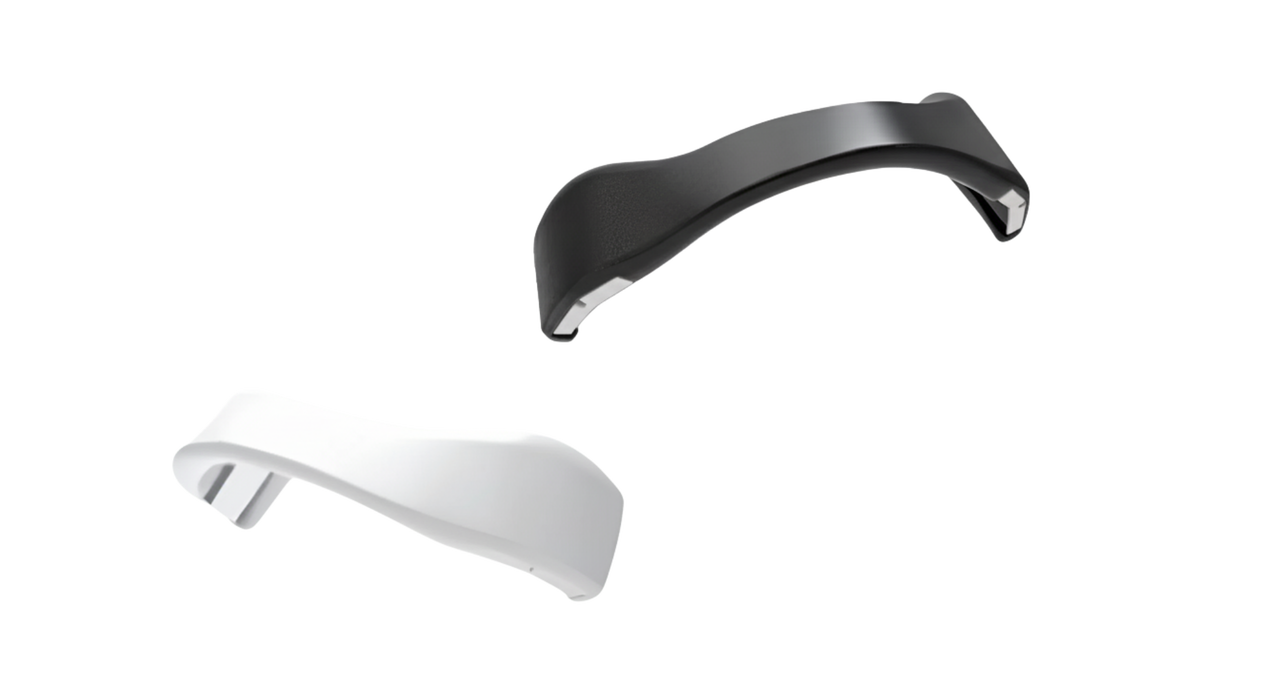

The Science Behind Better Breathing
Learn how to harness your breath for optimal health and vitality.
The Silent Killer
Most people don’t realize it, but the way they breathe every day is silently stealing their energy, their sleep, and their health... one shallow breath at a time.
67%
Can't Nose Breathe
Over two-thirds of adults say they struggle with nasal breathing, even when resting.
56%
Suffer From Snoring
More than 90 million American adults suffer nightly from snoring.
80%
Have A Deviated Septum
Septal deviation is popular, and in many cases leads to troubled breathing, nasal congestion, and sleep disturbances.
The Solution
When you take control of your breathing, you unlock health benefits you didn’t even know you were missing. Consistent nasal breathing triggers a powerful chain reaction, boosting focus, improving blood flow, increasing oxygen absorption, and strengthening your nervous system. It’s one of the simplest and most effective ways to upgrade your health. While other devices exist, ours is the only system designed to hold your nose open to its widest point and keep it there. Making healthy breathing effortless until it becomes second nature. Small shift. Big impact.
Ready to feel it for yourself?
80%
Nasal Airflow Improvement
AirMag Pro opens the nose up to 80% wider, making nose breathing effortless and effective.
87%
Reported Less Snoring
Out of the thousands who use AirMag Pro for sleep, 87% reported that their snoring noticeably reduced or stopped completely.
90%
Felt Sinus Relief
AirMag Pro can help counteract the symptoms of a deviated septum, offering instant sinus relief.
The Science
How you breathe impacts nearly every major system in your body. From brain function and emotional balance to heart health and digestion. Consistent nasal breathing acts like a tuning fork for your body, fine-tuning critical systems and driving measurable, noticeable improvements in overall health.
Here’s what you need to know.
Let’s Start With Public Enemy #1
Mouth breathing might seem harmless but it’s quietly wrecking your health. Research shows that over half of adults and even more kids habitually breathe through their mouths. And the consequences aren’t small. This everyday habit can throw off your cardiovascular system, disrupt your metabolism, wreck your posture, damage your dental health, disturb your sleep, and take a serious toll on your emotional wellbeing.
Here’s why kicking the mouth breathing habit matters:
It dysregulates your nervous system, fuelling long-term issues like anxiety, depression, and postural problems.
During exercise, it leads to shallow, inefficient breaths, driving up your heart rate, lowering oxygen levels, and causing quicker dehydration.
79.2% of habitual mouth breathers struggle with asthma, allergies, or respiratory illnesses.
Chronic dry mouth, gum disease, and accelerated tooth decay are all linked to mouth breathing.
It increases your risk of snoring, poor sleep quality, and insomnia.
Respiratory disease risks go up.
Oxygen deprivation can trigger more frequent headaches and memory issues.
Digestion slows, blood pressure climbs, and your brain gets less of the oxygen it desperately needs.
Bottom line: Mouth breathing isn’t just a bad habit. It’s a serious health threat. Recognizing the risks is the first step toward breathing (and living) better.
Snoring Problems?
Snoring is an incredibly common phenomenon that affects millions of people around the globe. It can be caused by a number of different issues, and if left unchecked can lead to further health complications. Let’s explore the various causes of snoring and why it's so important to address them.
Causes of Snoring:
Sleep position: Sleeping on your back can cause the muscles and tissues in your throat to relax, resulting in snoring.
Nasal problems: Allergies and other nasal issues can cause inflammation which can lead to snoring.
Weight gain: Excessive weight or obesity can cause the tissues in the throat to become overworked, leading to snoring.
Alcohol and sedatives: Alcohol and sedatives relax the throat muscles, which can lead to snoring.
Why Snoring Is Bad For You:
Poor sleep quality: Snoring can cause poor quality sleep, leading to problems with concentration, memory, and overall health.
Cardiovascular problems: Snoring can lead to high blood pressure, stroke, and heart disease.
Sleep deprivation: Snoring can lead to sleep deprivation, which can cause a variety of issues such as fatigue and irritability.
Relationship issues: Snoring can cause problems in relationships, as it can be extremely disruptive to a partner’s sleep.
Snoring can have a significant impact on both your physical and mental health. By understanding the causes of snoring, you can take steps to address the problem and improve your quality of life. Whether it is changing your sleep position, getting treatment for allergies or losing weight, there are a number of ways to reduce snoring and its associated risks.
How Your Breathing Pattern Impacts Your Sleep
The way you breathe during sleep has a massive effect on your health but most people have no idea... Nasal breathing, in particular, offers powerful benefits that mouth breathing simply can't match.Let’s break it down.
Benefits of Nose Breathing While You Sleep:
Helps reduce snoring and improves overall sleep quality
Filters, humidifies, and warms the air before it hits your lungs, lowering your risk of airborne illness
Supports natural stress and anxiety reduction
Regulates key hormones like melatonin and cortisol for healthier sleep cycles
Lowers the risk of cardiovascular issues, asthma, and other respiratory conditions
The Risks of Mouth Breathing During Sleep:
Causes dry mouth, bad breath, and increases cavity risks
Can trigger sore throats, chest discomfort, and morning headaches
Disrupts your body’s natural sleep rhythm, leading to fatigue and daytime brain fog
Raises the chances of congestion, sinus infections, and breathing problems
Reduces oxygen levels, putting extra strain on your heart, brain, and overall system
Nose breathing supports healthier, deeper sleep and better long-term health. Mouth breathing, while easy to slip into, can quietly chip away at your energy, immunity, and recovery over time. Choosing to fix it could be one of the smartest moves you make for your body.
Let's Talk Fitness
Staying active is essential for both your body and your mind. But when it comes to how you breathe during workouts, most people get it dead wrong. While mouth breathing feels easier when you're pushing hard, it actually limits your performance. Your body can't properly use the oxygen you suck in through your mouth, leaving you gassed out faster.
Nasal breathing, on the other hand, changes the game completely. Here’s why:
Benefits of Nose Breathing During Exercise:
Better oxygen delivery to muscles: More oxygen means stronger, longer-lasting performance and better endurance gains.
Enhanced cardiovascular endurance: Nose breathing helps regulate heart rate, keeping you in an ideal training zone longer.
Improved circulation: More oxygenated blood = better nutrient delivery and faster recovery.
Sharper mental clarity: Staying relaxed and focused mid-workout gives you an edge, rep after rep.
Greater respiratory efficiency: You’ll breathe less, work harder, and feel stronger over longer sessions.
Problems With Mouth Breathing During Exercise:
Weaker oxygen transfer: Muscles tire out faster, killing your strength and endurance.
Higher dehydration risk: Mouth breathing dries you out, hurting performance and recovery.
Shallow, inefficient breathing: Quick gasps waste energy and spike fatigue early.
Increased stress response: Mouth breathing triggers fight-or-flight mode, draining you mentally and physically.
Summary: Nasal breathing during exercise isn’t just a small tweak, it’s a performance boost. More oxygen. More endurance. More strength. Less stress. Less exhaustion. It’s the way your body was built to move and when you tap into it, you’ll feel the difference fast.
Oral Health: The Hidden Damage of Mouth Breathing
Mouth breathing doesn’t just affect your energy and sleep... it can quietly destroy your oral health over time.
Research shows that consistently breathing through your mouth can seriously harm your teeth and gums, leading to long-term problems that are tough (and expensive) to fix.
Here’s why mouth breathing is bad for your mouth:
The Risks of Mouth Breathing on Oral Health:
Bad breath: Reduced saliva production means food particles stick around longer, fueling bad odors.
Dry mouth: Without enough moisture, your teeth and gums are left vulnerable to damage and decay.
Tooth decay: Food debris and bacteria linger without proper saliva flow, eating away at your enamel and causing cavities, erosion, and staining.
Gum disease: Dryness allows plaque to build up, increasing the risk of infection and inflammation in the gums.
Jaw and bite issues: Chronic mouth breathing can affect jaw development, leading to overbites, misaligned teeth, and other orthodontic problems.
Summary: Mouth breathing quietly sabotages your oral health. By becoming aware of the risks and taking simple steps like using a humidifier at night or addressing nasal congestion with a nasal dilator you can protect your teeth, strengthen your gums, and keep your smile healthy for the long haul.
Brain Health
Breathing keeps us alive but the way we breathe shapes how well our brain works.
We often overlook it, but mouth breathing can quietly damage brain health and development over time, while nasal breathing helps the brain perform at its best.
Here’s why the difference matters:
The Hidden Dangers of Mouth Breathing on Brain Health:
Sleep disruptions: Mouth breathing can contribute to sleep disorders like Obstructive Sleep Apnea (OSA), leading to poor focus, memory issues, and slower reaction times.
Reduced brain oxygen: Long-term mouth breathing decreases oxygen delivery to the brain, triggering headaches, brain fog, and even symptoms of depression.
Imbalanced gas exchange: An unhealthy balance between oxygen and carbon dioxide can cause dizziness, confusion, and fainting episodes.
Oral health impacts: Chronic dry mouth fuels bacterial overgrowth, increasing the risk of cavities, infections, and inflammation that can further stress the body and brain.
Why Nose Breathing Supports Optimal Brain Function:
Higher oxygen efficiency: Nasal breathing delivers more oxygen where it’s needed most — fueling better mental clarity, focus, and cognitive performance.
Better airway support: It helps keep breathing passages open, lowering the risk of sleep-disrupting conditions like OSA.
Balanced CO2 and oxygen levels: Proper breathing reduces dizziness, brain fog, and mental fatigue.
Protection against oral bacteria: Healthier breathing habits help maintain a cleaner mouth, reducing systemic inflammation that can impact brain health.
Conclusion:
When it comes to brain health, how you breathe isn't a small detail, it’s a major factor. Mouth breathing can slow you down mentally, emotionally, and physically, while nose breathing can enhance sleep and athletic performance across the board. The good news? Small changes today can lead to powerful, lasting improvements on your mental and physical health for the rest of your life.
Get Started



